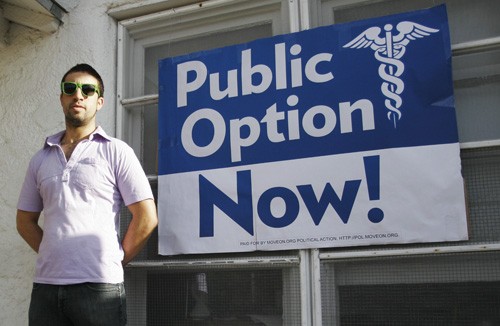As the national health care reform debate rages, the same passion seen in Washington D.C. legislators is also becoming apparent in UA students and faculty on both ends of the political spectrum.
Health insurance does not come cheap, and although some students and experts disagree over the exact means needed to provide expanded coverage, most agree that it is a necessary end.
Philosophy senior Chris Campas, who described himself as politically active, said he supports a plan — known as the single-payer system — where one institution would be the nation’s sole provider of health insurance. The impetus for reform, he said, needs to come from students.
“”Single-payer, single-payer, single-payer,”” he said. “”I’m disappointed in the president for not standing behind this more. Young people need to start demanding this. We’re young, we should have access. We pay for Medicare, it’s time we start receiving it.””
In a March 2008 report, the American College Health Association called for a standard that would make enrollment in a health care plan a prerequisite for enrollment in college. Unlike a growing number of public universities who have decided to adopt this standard, the UA requires only international students to have health care.
Students do not need insurance in order to access services at Campus Health Services, although the Campus Health Web site does encourage all students to acquire medical insurance as protection against unforeseen circumstances.
Kris Kreutz, the director of administrative services at Campus Health, said that if the UA required students to have health insurance it would add significantly to the cost of education.
Nevertheless, medical anthropology professor Susan Shaw said that being insured is worth the expense, especially for students. “”Health insurance is a really important predictor of how often you will get sick, and how well you will recover from being sick,”” she said. “”The importance of health insurance in a population cannot be overstated.””
Shaw added that recent media coverage of the health care debate has tended to obscure the extent to which Americans remain uninsured. One out of three Americans, she said, has been uninsured at some time in the past year, often as they move between jobs or between schools.
According to the Centers for Disease Control and Prevention’s Web site, a large percentage of those who do not have health insurance coverage in the U.S. fall in the 18-24 age range. Kreutz speculated that this might be due to young people no longer being eligible for coverage under a parent’s health insurance plan, although full-time students can usually be covered under a parent’s plan up to age 23.
Ben Poletta, a mathematics doctoral student, keeps a sign in his office window that says “”Public Option Now,”” in reference to the plan currently being promoted by President Barack Obama. Poletta is among those who believe that health care is a right that must be provided for by the federal government.
The government, he said, should be more accountable for the well-being of the American people, even if it harms private industry.
“”When the goal is to take care of people, not-for-profit enterprises serve the interests of American citizens better. Just like libraries, firefighters and policemen,”” Poletta said.
“”Students are young, we don’t think we need insurance. This is usually not a responsible choice, as young people engage in risky behaviors and then taxpayers end up paying the bill,”” he added.
Campus Health offers a few different student health care options. One is a full plan provided by Aetna that carries a premium and monthly bills. Terri West, an administrative assistant at Campus Health, said 5,470 students have enrolled in this option this semester. Another option, in which 2,550 students have enrolled, is the Campus Care Supplement, which asks a $100 per-semester fee for all the services Campus Health offers, with a small per-visit co-pay.
These enrollment numbers tend to change, West said, for a variety of reasons. Students who have a “”qualifying life event,”” such as marriage, divorce or no longer being covered by their parent’s plan, may enroll on a pro-rated status. The numbers can also drop if a student completely withdraws from school.
Another option for students who carry their own insurance plan or do not have insurance at all is to participate in ‘fee-for-service,’ whereby a student is treated by Campus Health and pays for the procedure. Students tend to opt for the fee-for-service route when they do not have insurance or when their insurance provider is deemed “”non-billable,”” West said.
Normally, these students are able to receive care on campus at a significantly lower cost than they might off campus, according to the Campus Health Web site.
Last year, Campus Health received 40,793 fee-for-service visits out of 70,789 total visits by students and faculty. These numbers indicate that 57 percent of Campus Health visits are fee-for-service, out of 47-49 percent of the student body that West estimates visits Campus Health at least once a year.
While it remains difficult to say for sure how much of the UA remains uninsured, Shaw said the issue cannot be ignored.
“”The problem of un-insurance in the U.S. is a huge problem that stretches across all populations,”” Shaw said.









